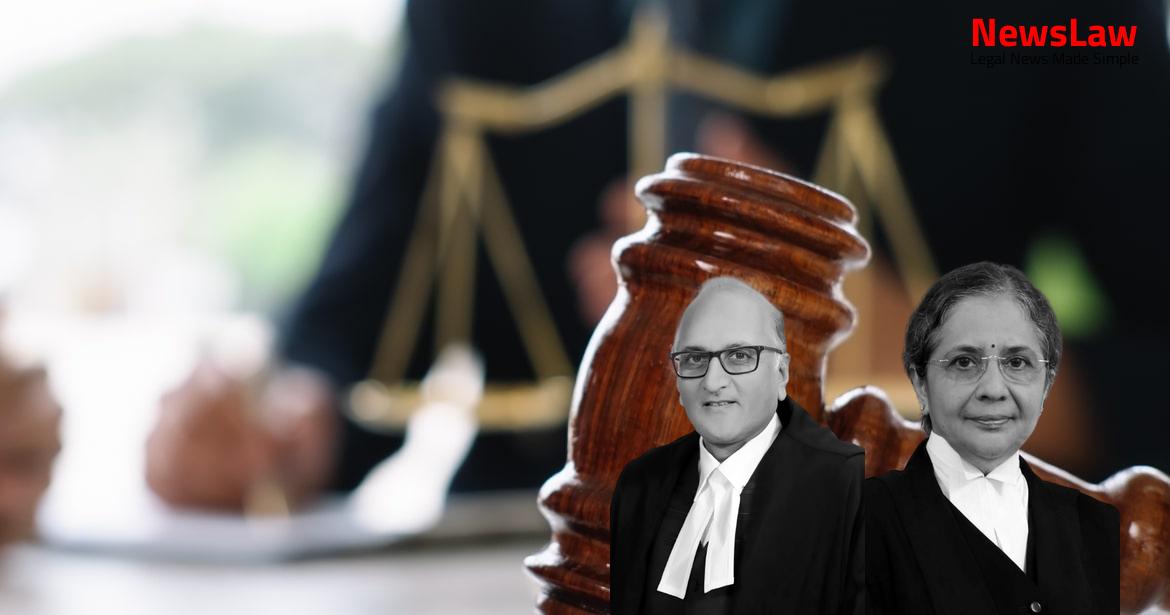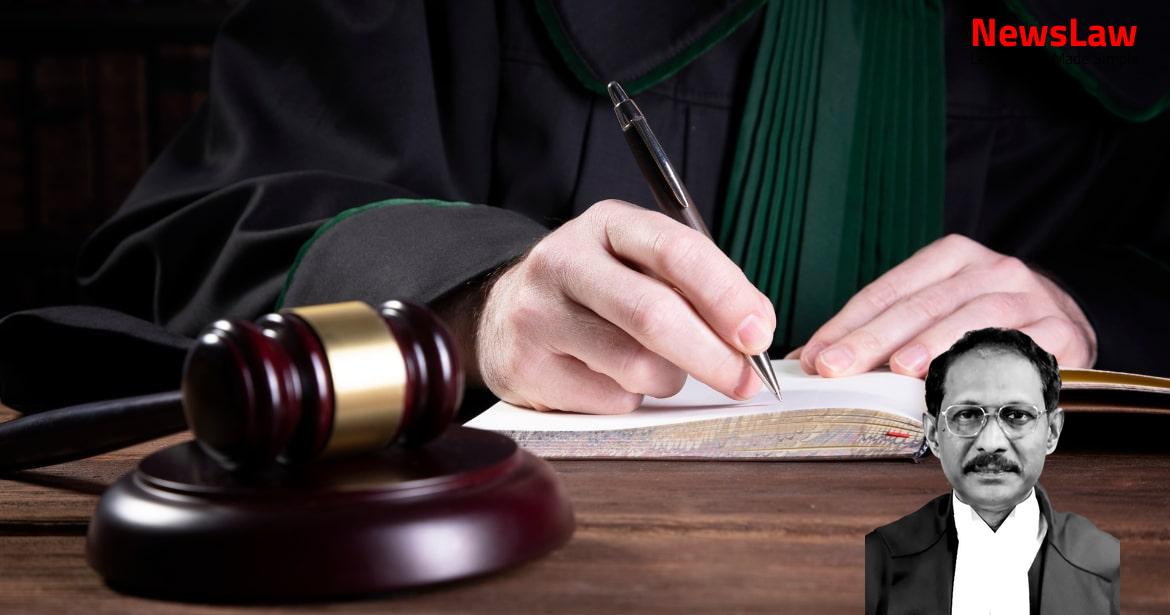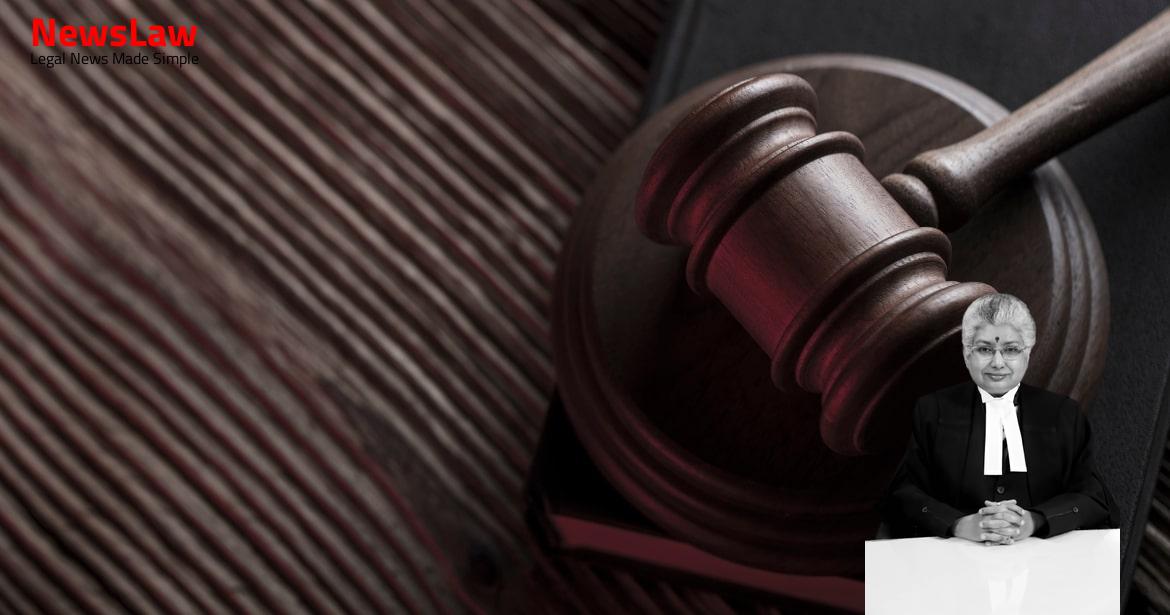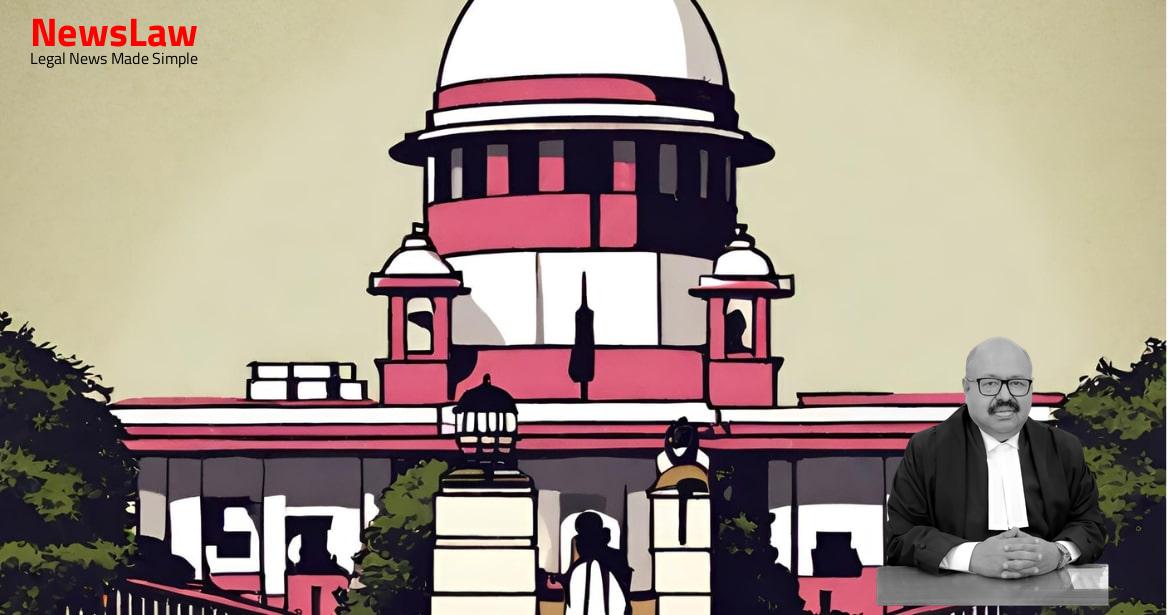Delve into the complexities of legal analysis in a high-stakes property dispute appeal. The court’s meticulous examination of evidence and application of relevant laws play a pivotal role in shaping the outcome of such cases. Follow along to unravel the intricacies of the court’s thought process and the impact it has on the final judgment.
Facts
- Special leave was granted for final disposal of the appeal regarding a judgment and order of the Punjab and Haryana High Court.
- The plaintiffs had exclusive possession as prospective purchasers and constructed residential and shop portions on the property.
- The defendants denied allegations and claimed peaceful possession of the shop and roof along with a chaubara constructed thereon.
- The property in dispute was purchased by Avtar Singh from Girdhari Lal with possession delivered to him.
- Market Committee assessed a portion of the property in the name of Bimla Devi separately.
- In 1978, Bimla Devi purchased a portion marked ‘IHDA’ and constructed a residential house in portion marked ‘OJHC’.
- The suit claimed that Girdhari Lal had no right, title, or interest in the property except for a pending sale deed.
- Defendant Nos. 2 to 4 were accused of illegally breaking the roof portion and constructing a staircase for forcible occupation of the first floor.
- Trial court and first appellate court dismissed the suit after considering evidence on record.
- High Court framed a substantial question of law regarding the findings of the lower courts in relation to the appellants’ claim of possession of the chobaras on the first floor of three shops.
- The question also pertained to the mandatory injunction to close holes in the lintel of the shop in Avtar Singh’s occupation.
- The High Court analyzed whether the lower courts ignored material evidence or misread evidence, leading to a perceived perversion in their findings.
Also Read: Electoral Malpractices in Mayor Election
Arguments
- Mr. Mohan argued that the plaintiffs admitted Avtar Singh’s tenancy before the execution of Ex.D-1 during the trial, which was not mentioned in the plaint initially.
- The High Court’s interference with the concurrent findings of fact was deemed unwarranted by the appellant due to various factors, including the due execution of Ex.D-1.
- The appellant highlighted that the registered sale deed for the property was given more weight by the lower courts than the unregistered agreement claimed by the plaintiffs.
- The appellant contested the High Court’s judgement, stating that it overturned the concurrent findings of fact based on a misappreciation of the circumstances from the record.
- Mr. Mohan emphasized that the substantial question of law framed by the High Court did not align with Section 100 CPC and accused the High Court of ignoring crucial evidence.
- Dimensions alleged in the plaint and of the chaubara found on the first floor were in accord
- Avtar Singh’s possession as the owner of the shop was not in dispute, the issue was regarding possession of the chaubara
- Commissioner was asked to inspect the site and report on precise dimensions of the premises
- Dimensions of the chaubara differed from what was alleged by the appellants/defendants
- Allegations of holes drilled on the lintels to make a separate staircase were supported by the Local Commissioner’s findings
- Appellants argued that the impugned judgment upset concurrent findings of fact
- Plaintiffs mentioned reconstruction of portions of the property, including two portions on the first floor of the three shops
- Suit averments indicated that after the agreement to sell in 1978, plaintiffs were given possession of the property
- Mr. Tarunvir Singh Khehar, counsel for respondents/plaintiffs supported the judgment in appeal
- Attention was drawn to the challenge against the report of the Local Commissioner
Also Read: Balancing Power and Transparency: Electoral Bonds Struck Down, Disclosure Mandated
Analysis
- The possession of the ground floor shop by Avtar Singh could not be denied.
- The exercise of jurisdiction and interference in the findings of the lower courts was deemed unwarranted.
- The Local Commissioner’s report supported the plaintiff’s case regarding the incomplete staircase.
- The Punjab Courts Act continued being a law after the Constitution of India came into force.
- Article 254 of the Constitution of India does not apply to laws continued under Article 372.
- The High Court’s interference with concurrent findings of fact was questioned.
- Section 97(1) of the Code of Civil Procedure (Amendment) Act, 1976 does not apply to Section 41 of the Punjab Courts Act.
- Mere findings of fact cannot be interfered with in second appellate jurisdiction under the Punjab Courts Act.
- Findings of fact must be reasonable and based on the record to avoid interference in second appellate review.
- The findings based on the Local Commissioner’s report were deemed reliable.
- The dimensions of the chaubara as per the report differed from Avtar Singh’s claims.
- The report confirmed the plaintiffs’ allegation of holes in the roof lintel.
- Section 41 of the Punjab Courts Act, 1918 continued to be in force, not Section 100 CPC.
- Section 41 of the Punjab Courts Act was made by a Provincial Legislature under the Government of India Act, 1915.
- The decision in Pankajakshi v. Chandrika was discussed in subsequent judgments of the Court.
- Interference in second appeal is only allowed on errors in law or procedure, not on questions of fact.
- High Courts cannot interfere with findings of fact based on evidence merely because they think another view is better.
- Constitution Bench ruling in Pankajakshi v. Chandrika stated that finding of fact recorded cannot be interfered with even under Section 41 of the Punjab Courts Act, 1918.
- The scope for interference in second appeal under Section 41 of the Punjab Courts Act applicable in Punjab and Haryana was delineated in Randhir Kaur v. Prithvi Pal Singh.
- The previous ruling in Kulwant Kaur v Gurdial Singh Mann, holding Section 41 inconsistent with Section 100 CPC, was overruled.
- High Court’s findings based on reappreciation of the record
- Consequent interference with concurrent findings of lower courts
- Impugned judgment to be set aside
Also Read: Recall of Resolution Plan Approval: Legal Analysis
Decision
- Appeal allowed without orders on cost.
Case Title: AVTAR SINGH Vs. BIMLA DEVI (2021 INSC 569)
Case Number: C.A. No.-006096-006096 / 2021



